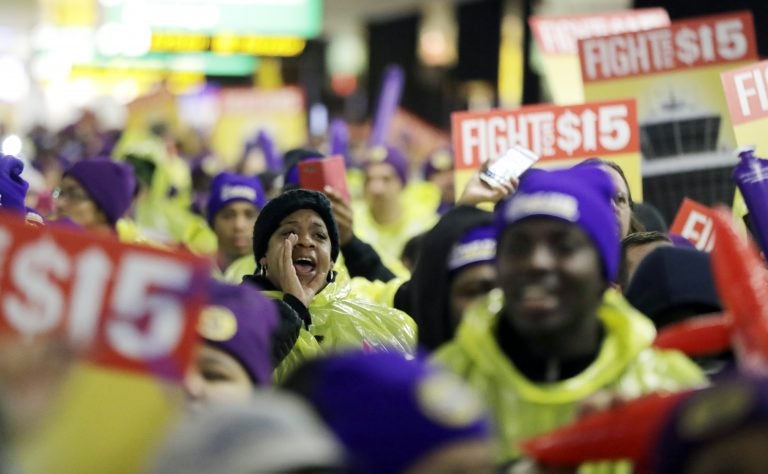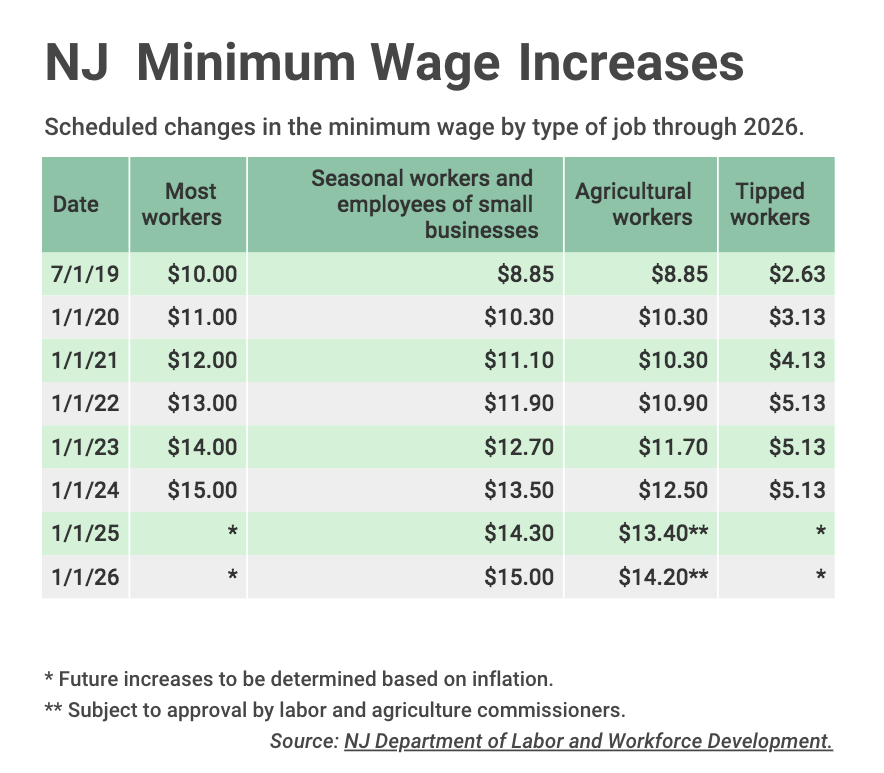N.J.’s minimum wage rises to $10 today in first step toward $15
The law increasing New Jersey’s minimum wage from the current $8.85 bears first fruit today

In this file photo, a woman shouts while marching with service workers asking for $15 minimum wage pay during a rally at Newark Liberty International Airport, Tuesday, Nov. 29, 2016, in Newark, N.J. (Julio Cortez/AP Photo)
This story originally appeared on NJ Spotlight.
—
Today more than 200,000 New Jerseyans are getting a raise to $10 an hour, the first in the state’s multi-year move toward a $15-an-hour minimum wage.
The Democratic-controlled Legislature passed and Gov. Phil Murphy signed the new wage into law five months ago as a way to provide all workers with a living wage in one of the highest-cost states in the nation. Last year’s ALICE report from the United Way of Northern New Jersey found that close to 40 percent of all households in the state, or 1.2 million, were either living in poverty or working poor and unable to afford such basic needs as food, clothing and shelter, with ALICE defined as Asset Limited, Income Constrained, Employed.
The minimum wage for most hourly employees will reach $15 by 2024, making New Jersey one of only five states plus the District of Columbia to have enacted a $15 minimum. DC will be the first to reach that mark, next July 1, followed by California in 2022.
Progressive groups fought hard for the higher wage and it was one of Murphy’s campaign promises. Business organizations opposed it. Neither side has changed its mind, with businesses saying it is going to lead to higher costs for consumers and could force some shops to close their doors, while supporters say it will both make it a little easier for workers to make ends meet and boost the economy as people have more money to spend.
“People have been pushed behind in this economy for far too long,” said Brandon McKoy, president of the progressive-leaning New Jersey Policy Perspective. “We are finally starting to get on the road to get to the true value of the work they are doing. It will help them better be able to take care of their families. And there will be gains in the local economies as they are able to afford to buy more things.”

Business concerns about affordability
But the New Jersey Business & Industry Association, which has been monitoring the expected impacts, said its members continue to be concerned about being able to afford the higher wage.
“Generally and not surprisingly, we’re seeing many of the same concerns we had noted while advocating for a phased in and limited increase — that they’ll need to raise costs or cut expenses to accommodate the higher rate,” said Michele Siekerka, NJBIA’s president and CEO. “Obviously, smaller businesses will be more impacted by this increase to $10 an hour. Whether that includes a small increase for the cost of a burger, as an example, will probably depend on the business.”
McKoy said the cost of some items may rise slightly, especially in restaurants. In Seattle, where the minimum wage is now $16 an hour for those in large firms and $15 — or $12 with $3 toward health benefits or tips — McKoy said prices rose about 7 percent.
“So maybe my $2 cup of coffee goes up to not even $2.20,” he said. “But why aren’t businesses anticipating that they are going to have more customers because there are going to be more people with disposable income?”
Most workers can be paid no less than $10 per hour starting today, an increase of $1.15 over the current minimum. A second increase to $11 is scheduled for January 1, 2020.
McKoy estimated that 242,000 workers — primarily in the hospitality and food service industry, retail sales, and office and administrative support positions — will benefit immediately. Another 275,000, those making between $10 and $11 an hour, should also benefit from the “upward pressure” that increasing the base salary to $10 is expected to have on their salaries. These account for 13 percent of the workforce.
Fines, penalties, ‘even imprisonment’
In a letter sent to employers last Thursday, the state’s labor commissioner and attorney general laid out the schedule of increases and warned that they will be vigilant in enforcing the new law and can impose “heavy fines, administrative penalties and even imprisonment” for violations.
“We will enforce these laws according to their terms, and we will not tolerate efforts to skirt labor protections,” the letter reads. “In particular, we have made it a priority to combat wage theft and employee misclassification — the practice by which certain employers have classified workers as independent contractors instead of employees, and thus deprived them of the statutory rights to which they are entitled. We will use our broad authority under the law to vigorously pursue the misclassification of workers, especially when the practice is designed to evade the protections our new minimum wage law promises.”
Seasonal workers, small business employees and farm workers get no increase today, while tipped restaurant employees get a 50-cent raise to $2.63, with tips required to bring them to the current minimum. Workers in businesses with five or fewer employees and seasonal workers at camps, pools and similar locations will reach $15 on January 1, 2026. Agricultural employees top out at $12.50 on January 1, 2024, with the possibility of an increase to $15 in 2027 if the heads of the state departments of labor and agriculture agree that it would not hurt the viability of farming in New Jersey.
Siekerka said the impact of the wage law will become even more pronounced next year as all workers get an increase January 1.
“We do expect that once we hit Jan. 1, 2020 those impacts will be more widely seen and felt, especially when the increase hits our tourism industry and seasonal workers, as well,” she said.
Michael Cerra, deputy executive director of the New Jersey State League of Municipalities, agreed.
“There will be an impact, but it’s likely to be more long-term,” he said, noting that local governments were not previously subject to the state’s minimum-wage law and adhered to the federal minimum — currently $7.25 an hour. “The jump between the federal and new increased state minimum will be greater … I don’t know if you can fully assess the year one impact until the next round of budgets are done for 2020 and you see the actual increases in salary line items.”
Not all workers will benefit
Advocates had pushed hard to try to prevent carve-outs in the wage and ensure that all workers, including those working on farms and in restaurants, would receive the same wage as others, but lawmakers and Murphy compromised.
“This is a long-fought victory by labor, grassroots activists, and advocates,” said Sue Altman, state director of New Jersey Working Families. “With every raise in the wage toward our fight for $15, we secure greater economic justice for working people across New Jersey, who can now support their families by covering the basics and buying goods and services from New Jersey businesses.”
Regina Egea, president of Garden State Initiative and a former chief of staff to Gov. Chris Christie, said the conservative-leaning organization is going to be monitoring the impact of the new wage.
“For many who operate on narrow profit margins, the employer has two realistic options: reduce staff hours and headcount, or raise prices,” she said. “We will be watching with interest the state’s employment reports in coming months to analyze the jobs numbers in the industries that employ minimum wage workers, like retail, for example.”
Legislators have been cognizant that the new minimum wage could have significant impacts on certain employers and have taken steps to try to mitigate these.
Tax credits, other help for employers
For instance, last month the Senate Labor Committee moved a bill (S-3483) that would provide as much as $10 million in state tax credits to companies that employ teenagers to help them pay the cost of the increased wage.
“We thank our policymakers for recognizing the need to be responsive to the new law, in real time, via their consideration of new legislation to mitigate unintended consequences,” said Siekerka, adding that workers under 18 are at risk of not being hired because of the higher rate.
Legislators also added $65 million to the proposed state budget to cover the cost of the increases in some specific areas:
- $20 million for direct service providers who work with the disabled;
- $15 million for nursing home employees;
- $21 million to cover a fee-for-service rate increase to $19 an hour for personal care assistants, including home health aides;
- $9 million in higher vouchers to pay for child care for Work First New Jersey recipients because the cost of care is likely to rise as daycare centers raise their fees to cover higher wage cost.
At first blush, it appears that all those additions survived Murphy’s line-item veto pen. In announcing his budget decisions on Sunday, Murphy said the budget includes money “to boost wages for those who work with the elderly and people with intellectual and developmental disabilities, and for the hard-working employees at subsidized child care facilities.”
While $15 has been the goal, the minimum wage is not likely to stay at that level for long. Hourly pay is going to continue to be subject to a 2013 state constitutional amendment requiring the minimum wage to increase yearly with inflation. Assuming an annual inflationary increase of 3 percent a year after 2024, NJPP projected that the state’s minimum wage in 2030 would reach $17.91 an hour.
WHYY is your source for fact-based, in-depth journalism and information. As a nonprofit organization, we rely on financial support from readers like you. Please give today.




